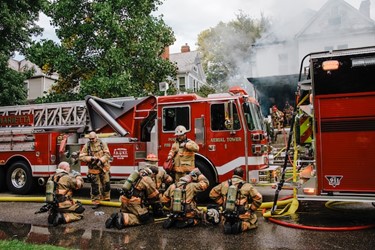Anthony Escamilla of Chicago has worked as a police officer and innovative leader with extensive experience in large urban law enforcement management and policy creation. Anthony has also earned master’s degrees in both Counseling Psychology and Police Psychology. In the following article, Anthony Escamilla discusses why it’s critical to prioritize mental health for first responders.
First responders are the heroes who rise to the occasion every day to serve their communities, protect families, and save lives. That often means putting their own physical and mental safety at risk. Police officers, firefighters, and EMS workers are subject to physical danger, witness traumatic injuries and death, face down fires, and more. They also face the daily stressors of urgent phone calls, cramped working quarters, demanding schedules, interrupted sleep schedules, and the constant need to prioritize the needs of others.
Because of this, first responders face mental health and wellness challenges that are unique to their professions. Fortunately, several organizations throughout the United States have recognized the need for greater mental healthcare and wellness training for first responders.
Anthony Escamilla of Chicago reviews just two examples of organizations and resources that have been made available over the last few years.
Anthony Escamilla on the Public Safety Wellness Unit of Irving, Texas
Following the 2016 suicide of a police officer, the police and fire departments of Irving, Texas recognized the need to prioritize systemic mental health and wellness support for their forces. This led to
the 2021 creation of the Public Safety Wellness Unit (PSWU) in Irving, a full-time, standalone unit that uses psychological first aid to mitigate the impact of a traumatic events and accelerate the first responders’ recovery process.
Anthony Escamilla, Police Officer explains that PSWU’s crisis counseling provides a three-point plan that offers a respectful environment for the individual to heal – acknowledging and normalizing their reaction to trauma while building a pathway to wellness and future stability. Employees at PSWU work to:
- Provide a comfortable and safe environment for processing the trauma.
- Provide stability and a short-term plan for understanding oneself and the situation.
- Connect the first responder with further resources and support based on their specific needs.
Anthony Escamilla, Police Officer says that in addition to its crisis response program, PSWU also provides preventative mental health and wellness preparation for first responders, such as biofeedback training, yoga, and more. The staff is available 24/7 and engages with new recruits to ensure that wellness and mental health stability are at top of mind for first responders, even before a traumatic event has taken place.

 Mental Health Resources for NYC First Responders Launched at the Onset of COVID-19
Mental Health Resources for NYC First Responders Launched at the Onset of COVID-19
Anthony Escamilla, Police Officer says that COVID-19 provided new and more extreme challenges for first responders, many of whom were on the front lines dealing the with death, illness, trauma, isolation, and uncertainty wrought by the pandemic. A
national survey conducted by Cohen Veteran’s Network (CVN) in 2020 showed 73% of healthcare providers (HCPs) felt their job was putting the lives of their family at risk because of the coronavirus. In New York City, where the effects of the virus were acute, 58% frontline HCPs were concerned about their mental health; 29% reported feeling scared. Despite displaying need for mental health support, two thirds of those surveyed said the pandemic made it harder to access proper care.
CVN provided two solutions in response:
- CVN Frontline, a resource center where first responders and frontline healthcare providers could access on-demand mental healthcare programming and training from a range of sources through videos, online tools, and assignments.
- Ongoing non-clinical support groups facilitated by licensed clinicians across its network that directly focused on issues that impact frontline healthcare providers.
Early Intervention in Mental Health Can Lead to Faster Recovery
Anthony Escamilla of Chicago explains that early intervention – including preventative training and on-demand 24/7 trauma care – is a crucial element of both the Irving, Texas and Cohen Veteran’s Network plans. The Pennsylvania Psychiatric Institute states that early intervention can improve a patient’s prognosis and long-term outcomes, minimize the risk of secondary complications, enhance social and emotional development, and promote family well-being.
Both programs also encourage early intervention by generally raising awareness in the community and reducing stigma around mental health, supporting routine screenings, and improving access to services.
Creating an Environment Where First Responders Thrive
Anthony Escamilla of Chicago says that prioritizing mental healthcare, wellness, and preventative training can build an environment in which first responders can thrive and not just survive. Early intervention, crisis response measures, and ongoing support will allow workers to combat burnout, build career longevity, and find their work rewarding and fulfilling, leading to a safer and more productive working environment for all.

 Mental Health Resources for NYC First Responders Launched at the Onset of COVID-19
Mental Health Resources for NYC First Responders Launched at the Onset of COVID-19